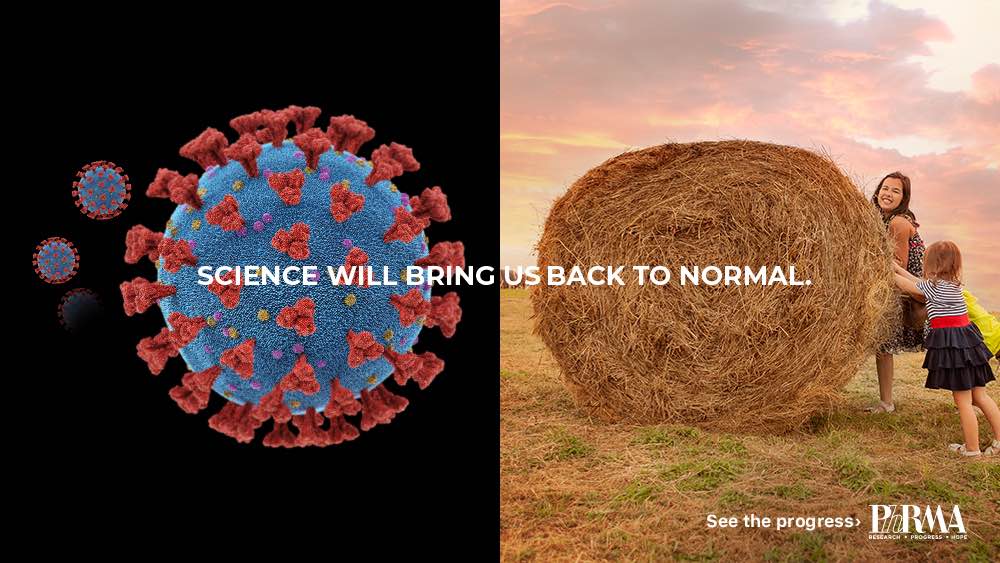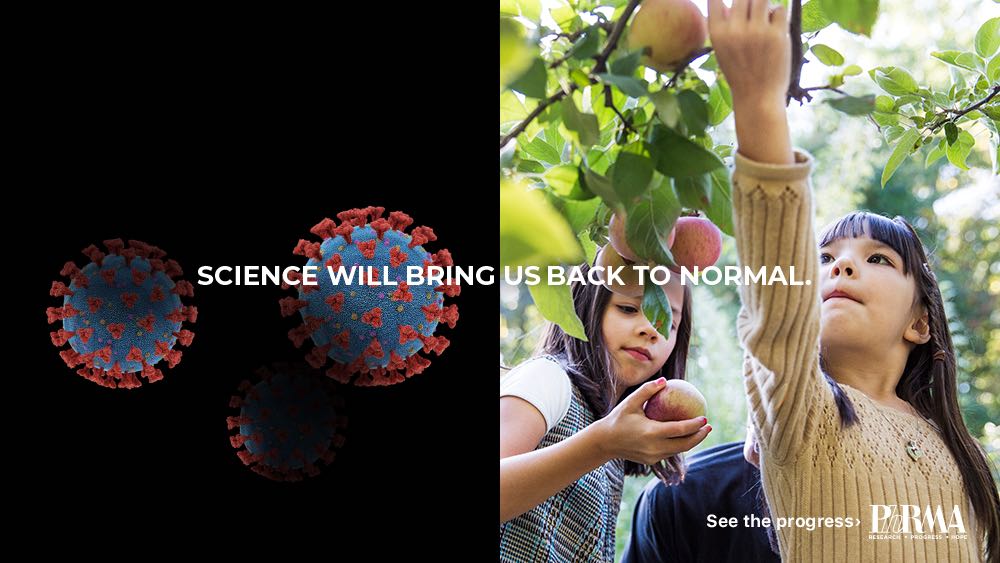| | | | | | | Presented By PhRMA | | | | Vitals | | By Caitlin Owens ·Oct 23, 2020 | | Good morning. Today's word count is 872, or a 4-minute read. | | | | | | 1 big thing: Trump and Biden portray radically different pandemics |  | | | Photo: Justin Sullivan/Getty Images | | | | President Donald Trump and Joe Biden offered radically different visions for what the next few months of the pandemic will look like — and how they believe the U.S. should respond — at last night's final presidential debate. Why it matters: Voters will probably choose the candidate who presented a version of the pandemic worldview they already hold, which varies starkly by party identification. - Trump's assertions that things won't be that bad this winter is likely to encourage plenty of people to let their guard down.
- But experts are nearly united in their assessment that the U.S. has a long few months ahead of it and that a stronger federal response would have made things less painful.
What they said: "We're rounding the corner. It's going away," Trump said. - Contrast that with what Biden said: "We're about to go into a dark winter... And he has no clear plan, and there's no prospect that there's going to be a vaccine available for the majority of the American people" until the middle of next year.
- "I don't think we're going to have a dark winter at all. We're opening up our country, we've learned and studied and understand the disease, which we didn't at the beginning," Trump responded.
The bottom line: This pandemic requires leadership to make terrible choices about businesses, schools and spending. But other countries have shown there are ways to successfully balance these tradeoffs while minimizing deaths. - And the best way to get the economy back up and running is to get the virus under control.
Go deeper. |     | | | | | | 2. How the coronavirus pandemic could end |  | | | Illustration: Sarah Grillo/Axios | | | | It's still the early days of the coronavirus pandemic, but history, biology and the knowledge gained from our first nine months with COVID-19 point to how the pandemic might end, Axios' Alison Snyder and Eileen Drage O'Reilly report. The big picture: Pandemics don't last forever. But when they end, it usually isn't because a virus disappears or is eliminated. Instead, they can settle into a population, becoming a constant background presence that occasionally flares up in local outbreaks. What's happening: The pandemic is deepening in the U.S., Europe and elsewhere in the world. - Experts — from the U.K.'s chief scientific adviser to pharmaceutical CEOs to the WHO — increasingly say SARS-CoV-2 is likely to circulate in the population on a permanent basis, mainly due to the foothold the virus has already established.
- But what damage endemic COVID-19 causes will depend on different factors, including how often people are reinfected, vaccine effectiveness and adoption, and if the virus mutates in any significant way.
"If the vaccine is really effective, like the measles vaccine or the yellow fever vaccine, it's just going to land like a ton of bricks and suffocate this. Maybe not quite eradicate it — yellow fever and measles are not eradicated — but it'll be an utter game changer," UC Irvine epidemiologist Andrew Noymer says. - But if the vaccines are less effective — as many experts expect for at least the first generation — COVID-19 may eventually behave more like the seasonal flu, Noymer says.
Go deeper. |     | | | | | | 3. The latest in the U.S. |  Data: The COVID Tracking Project; Note: Does not include probable deaths from New York City; Map: Andrew Witherspoon/Axios Gilead Sciences on Thursday received approval from the Food and Drug Administration for remdesivir, an antiviral treatment that has shown modest results against treating COVID-19. First-time applications for unemployment fell last week, according to Department of Labor data released on Thursday. Americans have cast more than 47.1 million ballots in the 2020 presidential election, surpassing the total early-vote count for 2016 with 12 days left until Election Day, according to a Washington Post analysis of voting data. |     | | | | | | A message from PhRMA | | Biopharmaceutical science fights against COVID-19 | | |  | | | | The biopharmaceutical industry is leading the way in developing new vaccines and treatments for COVID-19. The background: Biopharma companies across the U.S. are committed to developing solutions to help diagnose, treat and prevent the coronavirus. Find out more from the video. | | | | | | 4. The latest worldwide |  France has become the second country in Western Europe to surpass 1 million COVID-19 cases, Johns Hopkins University data shows. The number of hospitalized coronavirus patients in Europe is steadily rising, and hospitals are scrambling to prepare, the New York Times reports. "As Israel eases its second nationwide lockdown, a revolt among ultra-Orthodox Jews against public health guidelines is complicating efforts to control the coronavirus outbreak," the WSJ reports. |     | | | | | | 5. New AI tool for predicting Alzheimer's disease | | A new AI model is able to predict future onset of Alzheimer's disease around 7 years in advance of diagnosis using short speech tests, according to a new study published in The Lancet eClinicalMedicine. The big picture: There's still no treatment for Alzheimer's, meaning that there could be limited real-world demand by patients for such a tool today. But it could also be valuable for recruiting patients for clinical trials for potential treatments. Details: The model, developed by IBM Research and Pfizer, analyzed speech samples provided by the Framingham Heart Study, a long-term study that has been tracking thousands of people since 1948. - The samples were collected before the subjects began showing signs of cognitive impairment. Researchers then trained AI algorithms to correctly predict the eventual onset of Alzheimer's disease in healthy participants.
- "The production of speech is an intensely cognitive task," IBM's Ajay Royyuru, vice president of Healthcare Research, told Axios.
Why it matters: "It's not yet part of any clinical assessment that anybody does, but it could become part of what you do with some frequency," Royyuru said. - He also said that this kind of tool could be used to recruit patients who are in the right stage of the disease for clinical trials, which could help increase the odds of finding an Alzheimer's drug that works.
- "Early interventions can only be effectively tested and implemented if the population that stands to benefit can be identified," the study's authors write.
|     | | | | | | 6. Dog of the week! | | Bailey. Photo: Wendy Riemann Meet Bailey, who is very prepared for Halloween this year! - "Lots of cute puppies adopted during COVID, however this handsome fella is 14.5 year old Bailey, dressed as a pumpkin and playing in fall leaves last weekend," writes his mom, Wendy.
- "Bailey came from the Lost Dog and Cat Rescue in Virginia. We celebrated our 11-year adoption anniversary on October 3!"
- In case you forgot, my dog is ALSO from Lost Dog!!
Bonus: Bailey is currently competing in a costume competition. We wish him luck!! Dogs dressed up for Halloween. Photo: Wendy Riemann |     | | | | | | A message from PhRMA | | Biopharma is progressing in the fight to beat COVID-19 | | |  | | | | Biopharmaceutical companies across the country are collaborating in new ways to help defeat the coronavirus. The results: In a matter of weeks they've gone from potential treatments to antibodies and antivirals that have shown positive results. See how science can help us get back to normal. | | | | | | Axios thanks our partners for supporting our newsletters.
Sponsorship has no influence on editorial content. Axios, 3100 Clarendon Blvd, Suite 1300, Arlington VA 22201 | | | You received this email because you signed up for newsletters from Axios.
Change your preferences or unsubscribe here. | | | Was this email forwarded to you?
Sign up now to get Axios in your inbox. | | | | Follow Axios on social media:    | | | | | |









No comments:
Post a Comment